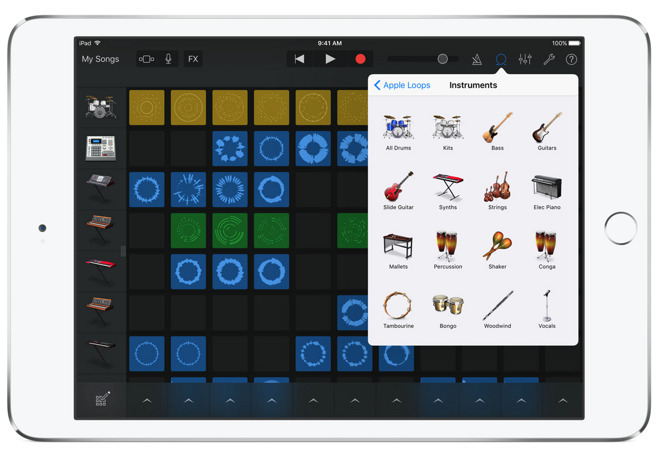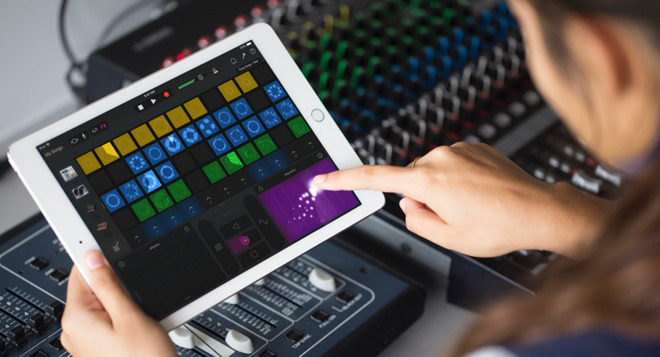Apple offers peek behind the curtain of GarageBand development, loop creation
To celebrate 15 years of GarageBand, Apple has offered a behind-the-scenes look at what went into the music creation tool's production, as well as providing access to the media to the Music Apps studio for the first time, revealing the amount of work that goes into producing all of its sounds and virtual instruments.

The introduction of GarageBand, allowing everyone to create music in a short space of time from their Mac or iOS device, has helped many artists break into the industry or produce new tracks for upcoming albums. As a relatively simple to use tool, it has a wide-ranging user base that counts many high-profile names as its users, including T-Pain, St, Vincent, Rihanna, and Fall Out Boy.
A key ingredient to the tool is its library of sounds, loops, and virtual instruments that can be brought into a GarageBand project and made to perform just how the user wants. In a feature by Rolling Stone, it reveals Apple goes to great lengths to make all of the noises that a user could ever want to produce.
Headed by 17-year employee Dr. Gerhard Lengeling, who joined Apple after it bought his company Emagic, the team of a "half-dozen members" spend time deciding the finer points of how everything should sound to users. The considerations range from the model of electric guitars used to how a string should sound when flicked on an iPad with different levels of force, within the Music Apps studio.
The production process can take weeks or months to create a new instrument, both for those using synthetic notes and for "real" sounds recorded from instruments. For the latter, the steps to record a note include the musician having to hold their breath for seven seconds to minimize extra noise for the recording, with repeated playing of the note with different finger positions, volumes, and pressures required.
For the creation of the East Asian instruments suite, Apple engineers went to the trouble of querying experts on the ideal color of wood needed for the app, as well as poem font choices.

Apple recently launched a promotion for its Everyone Can Create guides, with its Music guide focusing on GarageBand
While GarageBand and Logic have similar DNA, Apple has only really promoted the former in a major way, while also avoiding suggestion it was a professional tool. "The dynamic between GarageBand and our pro product, Logic, is organic," believes vice president of apps marketing Susan Prescott. "It's not 'create a feature for pro and stream it down' or 'design for consumers and then shove it up for pros,' we want to stay relevant for everyone."
As for the introduction of GarageBand itself as a product, it stemmed from an experiment in 2004, when Apple was looking for new ways computers could be used.
"Back when we were working on the original iMac, thinking about how the world was going to change around us, we were inspired by the idea of a new breed of software to connect all the things that were starting to appear," said SVP of worldwide marketing Phil Schiller. "Maybe someday the next John Lennon would discover their talent using the computer they got as a kid for Christmas."
The relative ease of access to GarageBand has led to it becoming an important part of commercial music production, alongside other major tools like Logic Pro X, Pro-Tools, and Ableton. Music producer Oak Felder suggests GarageBand has simplified collaboration to all users, making it easier to simply demonstrate their ideas with music instead of explaining it out.
Producer and A&R executive for Warner Mike Elizondo advises "Some people are so good at making demos in GarageBand that they bring in something and I'm like, 'We can use 80 percent of that as the final record if you want. There have been times an artist will bring in a vocal they recorded in GarageBand just using a laptop internal microphone and it sounds cool."
On the subject of future features arriving in the next few years, Schiller declines to provide specifics, but suggests "I think machine learning -- as in, systems and software that will enable more ability to help anticipate what someone wants to do -- will be of value."

The introduction of GarageBand, allowing everyone to create music in a short space of time from their Mac or iOS device, has helped many artists break into the industry or produce new tracks for upcoming albums. As a relatively simple to use tool, it has a wide-ranging user base that counts many high-profile names as its users, including T-Pain, St, Vincent, Rihanna, and Fall Out Boy.
A key ingredient to the tool is its library of sounds, loops, and virtual instruments that can be brought into a GarageBand project and made to perform just how the user wants. In a feature by Rolling Stone, it reveals Apple goes to great lengths to make all of the noises that a user could ever want to produce.
Headed by 17-year employee Dr. Gerhard Lengeling, who joined Apple after it bought his company Emagic, the team of a "half-dozen members" spend time deciding the finer points of how everything should sound to users. The considerations range from the model of electric guitars used to how a string should sound when flicked on an iPad with different levels of force, within the Music Apps studio.
The production process can take weeks or months to create a new instrument, both for those using synthetic notes and for "real" sounds recorded from instruments. For the latter, the steps to record a note include the musician having to hold their breath for seven seconds to minimize extra noise for the recording, with repeated playing of the note with different finger positions, volumes, and pressures required.
For the creation of the East Asian instruments suite, Apple engineers went to the trouble of querying experts on the ideal color of wood needed for the app, as well as poem font choices.

Apple recently launched a promotion for its Everyone Can Create guides, with its Music guide focusing on GarageBand
While GarageBand and Logic have similar DNA, Apple has only really promoted the former in a major way, while also avoiding suggestion it was a professional tool. "The dynamic between GarageBand and our pro product, Logic, is organic," believes vice president of apps marketing Susan Prescott. "It's not 'create a feature for pro and stream it down' or 'design for consumers and then shove it up for pros,' we want to stay relevant for everyone."
As for the introduction of GarageBand itself as a product, it stemmed from an experiment in 2004, when Apple was looking for new ways computers could be used.
"Back when we were working on the original iMac, thinking about how the world was going to change around us, we were inspired by the idea of a new breed of software to connect all the things that were starting to appear," said SVP of worldwide marketing Phil Schiller. "Maybe someday the next John Lennon would discover their talent using the computer they got as a kid for Christmas."
The relative ease of access to GarageBand has led to it becoming an important part of commercial music production, alongside other major tools like Logic Pro X, Pro-Tools, and Ableton. Music producer Oak Felder suggests GarageBand has simplified collaboration to all users, making it easier to simply demonstrate their ideas with music instead of explaining it out.
Producer and A&R executive for Warner Mike Elizondo advises "Some people are so good at making demos in GarageBand that they bring in something and I'm like, 'We can use 80 percent of that as the final record if you want. There have been times an artist will bring in a vocal they recorded in GarageBand just using a laptop internal microphone and it sounds cool."
On the subject of future features arriving in the next few years, Schiller declines to provide specifics, but suggests "I think machine learning -- as in, systems and software that will enable more ability to help anticipate what someone wants to do -- will be of value."

Comments
You don’t need that last word.
As for the notion of “machine learning” in the “what’s coming in the future” commentary from Schiller, well, it certainly does make him appear to be the marketing executive. AI is the flavor of the moment, so this comment from him is not any kind of valuable insight, or even a worthwhile statement to bother making. AI gets mentioned constantly, for everything, and it really means nothing. Certainly not what people think it means. There is no “machine learning”, and there is no “artificial intelligence”. We don’t even know how intelligence works for things that actually have it (such as animals). At best, we’ve determined it may be an emergent property of millions of small systems. We can replicate unpredictable behavior accidentally with things like Windows.
Yes, the OS. Every computer I’ve ever used with Windows has a level of unpredictability that makes it very easy to anthropomorphize into an antagonistic “intelligence” that wants to create impotent rage. Even its developers don’t know what the hell makes the many thousands of things that go wrong with it. It isn’t worth anyone’s time to figure it out, because they want to move on to the next sale or support call ASAP. Reinstall to fix every problem without figuring out what the actual cause is. In this way, we’ve succeeded in creating a seemingly living organism in one way: thousands of interacting systems creating emergent properties not originally intended.
I can’t wait until the AI thing stops being the flash in the pan media darling and developer fad, just like I long for the day when the flat design fad is an embarrassing memory. Basically, remember when everyone harped on about “virtual reality” in the 90s? Same thing. Even that hasn’t gotten into any type of mainstream success, and it may never. The reach exceeds the grasp, both technically and financially for the people expected to buy the half-assed demo tech that comes along.
Maybe these are all steps along the path to better things, but maybe they’re also pathological. While we are exploring things, it would be really nice if people could use language accurately and not behave as though the current fad is the universal panacea or ultimate answer to every need. Until it demonstrates actual awareness and intelligence, just call it what it is: statistics and cleverly written algorithms (that don’t always have predictable results, especially when no one wants to perfect the software before pushing it out on the market and working on the next product that will also not refine the design or correct the existing bugs... as we have right now with the systems that give us touch keyboards and autocorrect. It’s like one person wrote the thing, left the company, and no one else is motivated to continue the work. Half-assed is great when it first hits the market and people are amazed at what it can do. Give it ten years of not improving from there and we start to realize just how poor its actual results are for a good percentage of time (especially when we improve our own speed and the software behavior does not scale up to meet us).